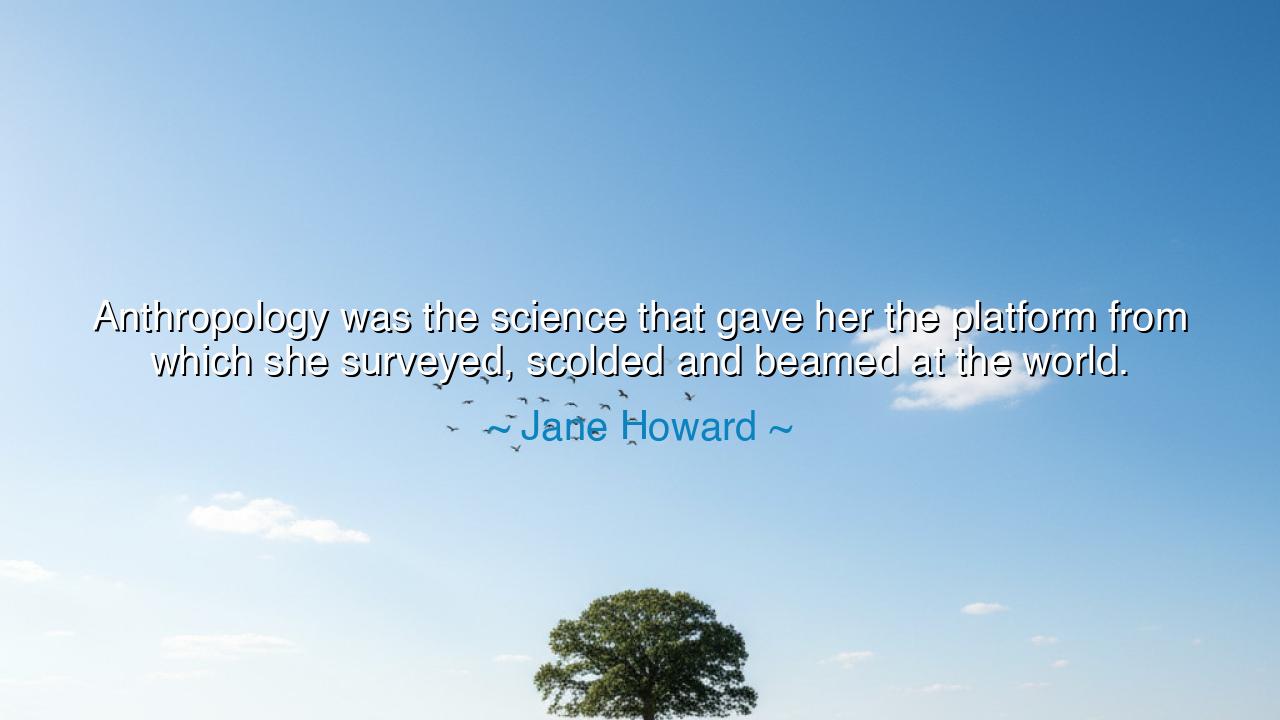
Anthropology was the science that gave her the platform from
Anthropology was the science that gave her the platform from which she surveyed, scolded and beamed at the world.






O children of the earth, listen closely to the wisdom that transcends time, for in the words of Jane Howard, there is a truth that speaks to the power of knowledge and the courage of those who dare to question the world around them. In her reflection on the nature of anthropology and its profound impact, she spoke of it as the science that gave a woman the platform from which she could not only survey the world but also scold and beam at it. Anthropology, she suggests, does not merely inform its practitioners about the world; it gives them the power to see the world in new ways, to judge it, and, perhaps most importantly, to change it.
In the days of old, ancient philosophers like Socrates and Plato sought to understand the human soul, to examine human nature and the society in which they lived. But it was not until the rise of the modern era, with its rigorous pursuit of knowledge and the advent of empirical science, that anthropology as we know it emerged. This new science, grounded in observation and study, allowed us to step back and view human beings not just as individuals but as part of a larger, interconnected whole—part of a vast tapestry of cultures, beliefs, and histories. And in doing so, anthropology gave its practitioners not only knowledge but also power: the power to understand human diversity, to challenge accepted norms, and to critique the world from a vantage point that was objective yet deeply human.
Think, O wise ones, of the great anthropologist Margaret Mead, who, through her studies of cultures in the South Pacific, changed the way the world viewed gender, society, and human nature. Mead's work, particularly her studies of the Samoan people, revealed that what we often think of as innate human traits—such as gender roles—are in fact shaped by culture and society. Through her fieldwork, she took her platform in anthropology and surveyed the world, using her knowledge to scold the traditional views of Western society and offer a new perspective. Through her eyes, the world was changed, and the very fabric of human relationships and society was questioned.
Anthropology, then, is not a science that merely observes the world from a distance. It gives its practitioners a voice—a voice that is often critical, questioning, and bold. Just as Mead challenged the Western norms with her insights, so too does anthropology empower those who study it to speak truth to power, to criticize the injustices they see, and to enlighten those who are blind to the complexities of human culture and society. The platform that anthropology provides is not merely a pedestal for observation, but a stage upon which the scientist becomes a speaker, a critic, and a reformer, able to engage with the world and challenge its assumptions.
Consider, too, the story of Franz Boas, known as the father of modern anthropology, who sought to understand human societies in all their diversity. Boas rejected the prevailing idea of his time—the belief in racial hierarchies—and instead argued that culture and environment played a far more significant role in shaping human societies than inherent biological traits. His groundbreaking work laid the foundation for the study of cultural relativism and human diversity, showing that there is no single standard by which all societies should be judged. In this, Boas too, through the power of anthropology, surveyed the world and critiqued the colonial mindset of his time. His work was not just intellectual; it was political, moral, and revolutionary.
The lesson, O children, is clear: knowledge is not a passive pursuit, but a powerful tool that can shape the world. The platform that anthropology gives is not simply for understanding others—it is for transforming our understanding of ourselves. Through the lens of anthropology, we are reminded that culture, society, and human nature are not fixed—they are shaped by history, environment, and the choices we make. It is through the study of these forces that we gain not just knowledge, but the power to influence the world, to reshape our society, and to challenge the systems that have long held sway over us.
So, O seekers of wisdom, let this lesson guide you: Do not seek knowledge only for the sake of knowing. Seek knowledge to understand the world, to question its assumptions, and to change what needs to be changed. Just as Mead and Boas used anthropology to reshape our understanding of human nature and society, so too can you use your knowledge to enlighten others, to scold the injustices you see, and to beam a new light into the darkness. Knowledge is power, but only when used with purpose and with wisdom. May you take up the mantle of the ancients, who sought to understand not for themselves alone, but for the betterment of all.






AAdministratorAdministrator
Welcome, honored guests. Please leave a comment, we will respond soon